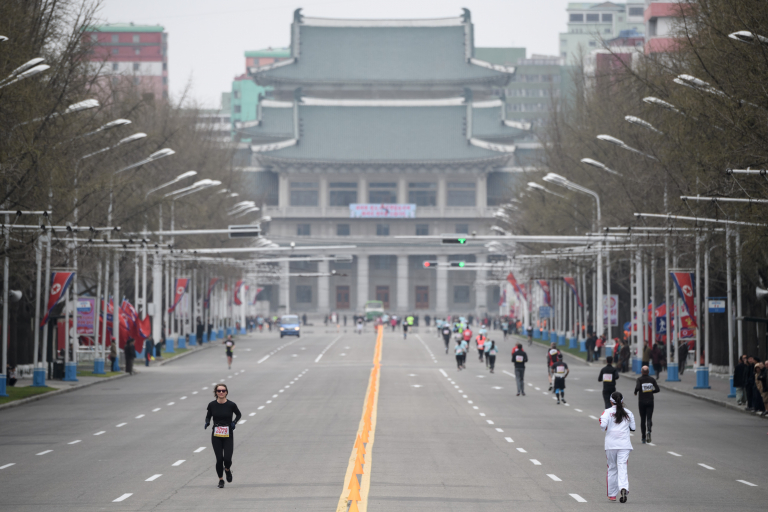Loneliness of the long distance runners in North Korea

Competitors run along a wide street during the annual Pyongyang marathon in Pyongyang on April 8, 2018. The event – part of the celebrations of the anniversary of Kim Il Sung’s birth in 1912 – has consistently been its annual peak for Western tourism to the isolated country, offering visitors the chance to run or jog through the streets of Pyongyang. Image: AFP/Ed Jones
A few hundred foreigners lined up in Kim Il Sung stadium Sunday for the Pyongyang marathon, less than half of last year’s contingent with Western tourism to North Korea battered by nuclear tensions and a United States travel ban.
A packed crowd in the 47,000-capacity arena cheered and applauded before the runners streamed out of the stadium beneath portraits of the North’s founder and his son and successor Kim Jong Il.
Article continues after this advertisementThe event, part of the celebrations for the anniversary of Kim Il Sung’s birth in 1912, is normally the annual peak for Western tourism to the isolated country, offering visitors the chance to run or jog through the streets of Pyongyang.
But fears of conflict reached fresh heights last year as the North made rapid progress in its nuclear and missile ambitions under Kim Jong Un, the third member of the Kim dynasty to rule, carrying out its most powerful atomic test to date and launching rockets bringing the continental United States into range.
Several new sets of United Nations Security Council sanctions were imposed, and in September, Washington effectively banned United States citizens from visiting following the death of tourist Otto Warmbier, while several other countries stepped up their travel warnings.
Article continues after this advertisementThe measures remain in place despite a rapid rapprochement triggered by the Winter Olympics in the South, with Kim due to meet the South’s President Moon Jae-in later this month, ahead of a summit with U.S. President Donald Trump.
A total of 429 foreign amateurs entered the Pyongyang Marathon this year, compared with more than 1,000 in 2017.
“The tourism industry in general has fallen substantially since the middle of last year,” said Simon Cockerell, general manager of Koryo Tours, the market leader. “All the political dramas, military crises have brought the industry down by at least half.”
Twin tourers
Two North Korean twin sisters, Kim Hye Gyong and Kim Hye Song, took first and second in the women’s race Sunday, matching each other stride for stride and gesture for gesture as they came up the finishing straight, the younger of the 25-year-olds crossing the line less than a meter ahead.
Local runners also filled the first three places in the men’s race, with the first invited elite competitor, a Moroccan, trailing in fourth and observers suggesting the cold conditions, in the single degrees Celsius, did not favor African runners.
Australian Tracy Britten, who ran the 10-kilometer race, said doing so was “surreal.”
“You just don’t know what to expect, so here you are in the streets of Pyongyang running around, people are giving you a high five and it’s just an incredible experience.”
Western tourists to the North used to run at around 5,000 a year, with U.S. visitors making up about 20 percent, and critics say that Pyongyang profited from their presence.
Standard one-week trips cost around $2,000 (about P104,000), while shorter budget journeys can be less than half that price.
Warmbier, a University of Virginia student, had tried to steal a propaganda poster, was convicted of subversive activities and sentenced to 15 years’ hard labor.
He was sent home in a mysterious coma last June, dying a few days later, with Trump tweeting that he had been “tortured beyond belief” while Pyongyang blamed botulism, although medical examiners said he suffered brain damage caused by a lack of oxygen.
But Cockerell told AFP that on the “battlefield of soft power,” Washington had inflicted “a stunning defeat on itself” with the travel ban.
“The complete absence of Americans cedes the ground to the DPRK state to present Americans any way it wants without even a few local people encountering visitors from the U.S. and seeing what people are really like there,” he said.
‘Aura of danger’
Young Pioneer Tours, the firm which took Warmbier to North Korea, also saw its marathon customers fall by more than half, although guide Matt Kulesza said that its overall numbers for this year were on target.
For some travelers, he said, controversy about the country “almost appeals to people,” so that to some extent “all publicity is good publicity,” although the current warming on the peninsula could change that.
“With so much positive talk of the DPRK in the media maybe that aura of mystery, that aura of danger is almost disappearing,” he added.
But British television student Callum McCulloch, 23, had no doubts.
Describing Pyongyang as “like the set of a Wes Anderson film” after his half marathon, he dismissed the Foreign Office’s advice against “all but essential travel” to the North.
“If someone tells you not to go somewhere, not to do something, that makes you more want to go there, surely,” he said. “It’s bragging rights. My mates owe me a few pints when I get home.” JB
RELATED STORIES:
What to do post-run to maximize your results
LOOK: 3 new running books to level up and inspire your training